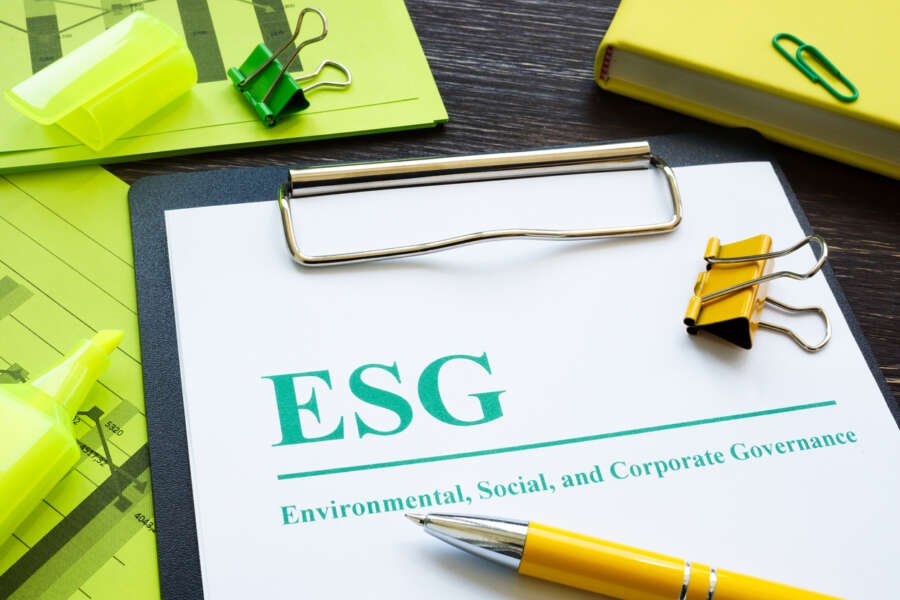By Steve Hall, President and Partner, ISG
In the wake of COP26, we are all more aware of the responsibility we have to protect our environment. Businesses are coming under increasing pressure from customers, employees, competitors, and investors to establish and work towards ESG goals.
We’re also seeing increasing regulation in this area, especially from the European Union. As a result, large businesses that don’t meet their ESG goals will start to become less desirable to enterprises looking for partners and suppliers, or even considering M&A targets.
The EU has introduced the Sustainable Finance Disclosure Regulation, which establishes transparency over progress the financial sector is making on sustainability efforts. It will, for example, aim to prevent financial services firms “greenwashing” ―talking a good game but failing to put their words into action.
There’s also the Corporate Sustainability Reporting Directive, which will impact any listed company with more than 500 employees. Companies will need to report on what they’re doing regarding environmental protection, human rights, social responsibility, employee treatment, anti-corruption and bribery and boardroom diversity (for gender, age, educational and professional backgrounds).
Regulation will continue to evolve, especially after COP26. ESG regulation will play a major role in reshaping how big businesses operate – sometimes in unexpected ways. For example, businesses that want to attract and retain the best talent will find that their ESG actions play more of a role in people’s career decisions.
Managing this manually – as many companies still do – is a Herculean task. Technology is the only way to really manage ESG commitments and goals all the way through the supply chain. It can support this in a number of ways:
- Large businesses and financial service providers need an end-to-end view of their impact
Businesses will need to see the full scope of their ESG impact, both direct and indirect (through their supply chain).
Environmental impact includes things like ensuring the CIO knows about the business’ CO2 emissions (and those of any providers). How does the business deal with its waste? Does it indirectly contribute to deforestation? (For example, beef production is the primary driver of deforestation, followed by clearing land for soy farming – to feed farm animals.)
Working conditions are one of the social factors to consider, including the conditions at supplier businesses. Fashion and technology are just two industries that are already being scrutinised for labour abuses and slave labour down their supply chain. Diversity is also going to become a bigger issue.
Governance-wise, businesses will need to focus on areas like the structure and diversity of the board, as well as executive pay.
Large businesses and financial service providers need a system to track all these processes at every stage. Digitalisation and automation will become essential tools for monitoring every ESG touchpoint and having a clear audit trail for compliance.
- Reimagine agreements with providers
Agreements and contracts are already changing to ensure compliance with regulations governing the entire supply chain. But they need to be enforced.
Don't miss out on any breaking news or insightful opinions!
Subscribe to our free newsletter and stay updated on the go!
By submitting this form, you are consenting to receive marketing emails from: Global Banking & Finance Review. You can revoke your consent to receive emails at any time by using the SafeUnsubscribe® link, found at the bottom of every email.
If a business is to be held accountable for the ESG progress of its suppliers and partners, it has to have assurances in place from them. For example, major retailers won’t be able to say “we didn’t know” when reports surface of people working in poor conditions in their supplier’s factories.
Infosys, for example, has a supplier code of conduct that helps it manage “sustainable business practices” within its supply chains.
Businesses will need access to all ESG-relevant data – data that’s currently decentralised and scattered. Even in large corporations, there is no corresponding central data pool that contains all relevant data. Instead, they have “data lakes” scattered across the different departments.
This data must be centralised, structured, measurable and analysed so that, for example, ESG-compliant products can be created. Data sharing and transparency will be crucial, as will the ability to enforce the appropriate contractual obligations.
- Keep track of your progress
While many companies will have already created an ESG strategy, they must ensure they have KPIs in place and regularly track their progress.
Data analysis, digital transformation and automated processes all are extremely helpful in keeping track of progress towards ESG goals.
- The right talent and focus
Ultimately, adapting to ESG standards is just another transformation project. Businesses need the right people leading this initiative and enough people with the skills required to do the work. Training and recruitment will be essential.
The transformation to an end-to-end ESG-compliant company needs to have IT at its heart. Which areas of IT are ESG-relevant? And in what ways can IT help with implementation?
Sometimes businesses focus on one area more than the others; they may, for example, look at CO2 emissions and decide that data centres and assessing corporate travel is an excellent place to start. While this is true, all areas need the same level of attention.
- Bring in help
It may be best to work with external partners experienced in transformation projects (especially ones driven by IT). It’s important to develop a genuine partnership with open communication, prompt delivery on deadlines and a commitment to an end-to-end approach.
These partners can help businesses assess how ready they are to carry out ESG work and what their unique support programme would look like.
Large companies (and any business in the financial services sector – including advisors) need to start asking themselves questions about how prepared they are to work towards their goals. It’s an issue that will only become more urgent – for business success, in particular, and the future of our planet, in general.






